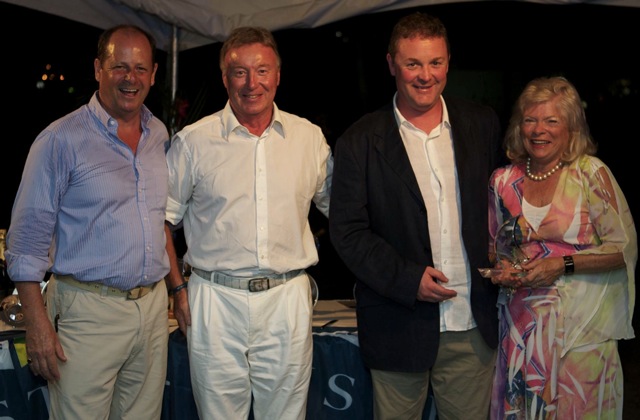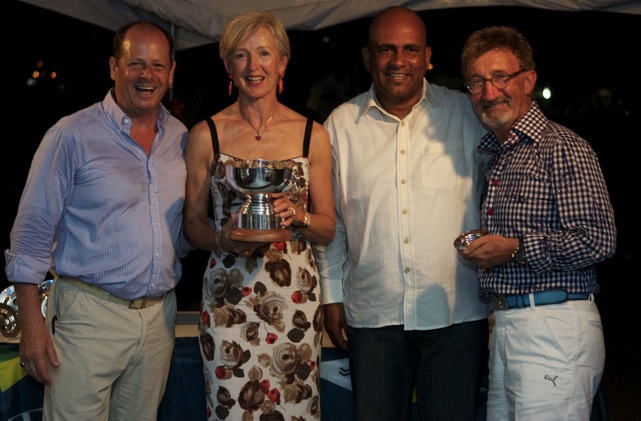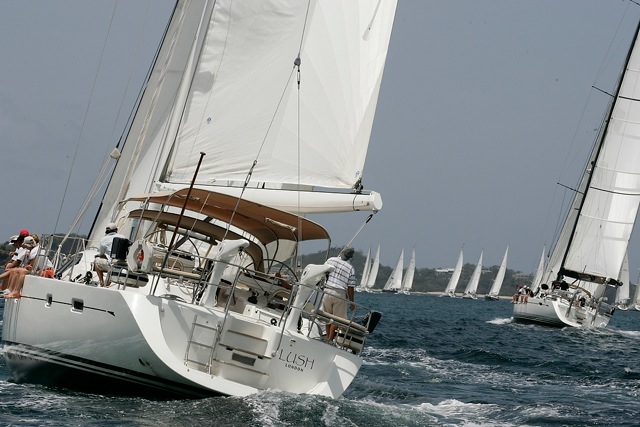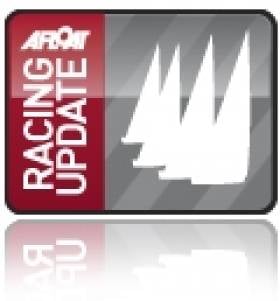Displaying items by tag: Oyster regatta
Eddie Jordan on the Podium in Grenada
Royal Cork's Stephen and Aileen Hyde's Oyster 56, A Lady, just missed out on a podium finish having just returned to the Caribbean following their 15 month circumnavigation.

The happy smiling faces dockside at Port Louis were testament to a truly memorable Oyster Regatta on the magical island of Grenada. However there was an element of tension in the air, as Pantaenius Race Day was the last race to be sailed and a dramatic conclusion was to follow. The race area south west of Grenada was sublime, sunshine and crystal clear water with a warm breeze, which developed during the day, to a steady 12 knots.
Jonathan and Jane Mould's Oyster 72, Koluka continued their domination of Class One with their fourth victory, a clean sweep. An impressive performance but the couple did not come to Grenada just to compete, Jonathan and Jane were accompanied by their extended family, both daughters, husbands and grandchildren. "To be honest with you, the racing has been the most relaxing part. With three grandchildren all two or younger, it is a busy time ashore. My wife Jane has done most of the baby-sitting while I have gone sailing. It has been a lovely experience, it is always nice to do well but to be in such a wonderful place with my family that is something to savour for years to come."


Chris and Susan Shea's Oyster 72, Magarathea was a gallant second, who scored consistently through the regatta. Eddie Jordan on board Oyster 655, Lush finished the regatta in style with their best result of the week, a close second to the overall winners Koluka.
Alan and Sue Brook's Oyster 56, Sulana were clear leaders this morning but a dramatic event on the racecourse nearly cost them victory. A coming together with John McTigue's Blue Dreams meant a 20 percent penalty, resulting a 10th place for Sulana for the final race. However, their string of wins prior to the last race meant that Sulana held on to the top spot to win Class Two.
Alan Brook commented: "We have been in Grenada for six weeks now and I can safely say it is an excellent place for many reasons and a very fitting venue for Oyster yachts and their owners, I have an excellent crew on Sulana who all worked well together to contribute to our success but I think that we can all leave Grenada as winners, it has been an excellent event."
Second in Class Two was Scott Bickford's American Oyster 56, Contingency. David Fass' Oyster 56, A Sulana was third by just a single point. Meaning that Ian Galbraith's Scottish Oyster 53, Jigsaw and Stephen and Aileen Hyde's Irish Oyster 56, A Lady, just missed out on a podium finish.
Stephen and Aileen Hyde left Crosshaven, in Southern Ireland in the summer of 2009 and haven't been back since. After cruising their Oyster 56 down to Las Palmas, they crossed the Atlantic and continued west with the World ARC fleet. Stephen has written fascinating account of their 30,000-mile circumnavigation, which is being published in Oyster News.
'Without doubt, the most amazing place we have visited was the San Blas Islands." Commented Stephen. "The archipelago is composed of approximately 200 islands off the coast of Panama. Beautiful beaches free from crocodiles and mosquitoes and brilliant diving in the reefs, crystal clear waters with an amazing variety of wildlife, even black tipped Reef Sharks, which would often swim with us. When I suggested to my wife that we should sail around the world, she said absolutely nothing – No comment. However with just a few days to go until the start, she told me she was coming and was going to sail every mile. It has been a fantastic adventure."
On the final night of the Oyster Regatta Grenada, the prize giving party was held at Port Louis Marina. The new facility has been a splendid setting for the Oyster fleet and a fitting venue for the closing ceremony and party. Over 230 guests attended the evening with Grenadian Minister of Tourism, Hon. Peter David, as Guest of Honour. "Sailing is very important to Grenada, it is deeply rooted in our culture and I speak for the Prime Minister and all Grenadians, that we were delighted to welcome all of the Oyster yachts to our island and hope that you all return soon." Commented Peter David
After the prize giving, a gourmet four-course meal was served, it was a very happy occasion with crews toasting each other and recalling memorable moments during a fantastic week. A brilliant firework display over the marina capped off a truly wonderful regatta. The Oyster Regatta in Grenada had been a roaring success. Probably one of the main reasons for that is the warmth and friendship of the people of Grenada, something that the Oyster family appreciates a great deal.
Photos: Oyster/Ingrid Abery





























































